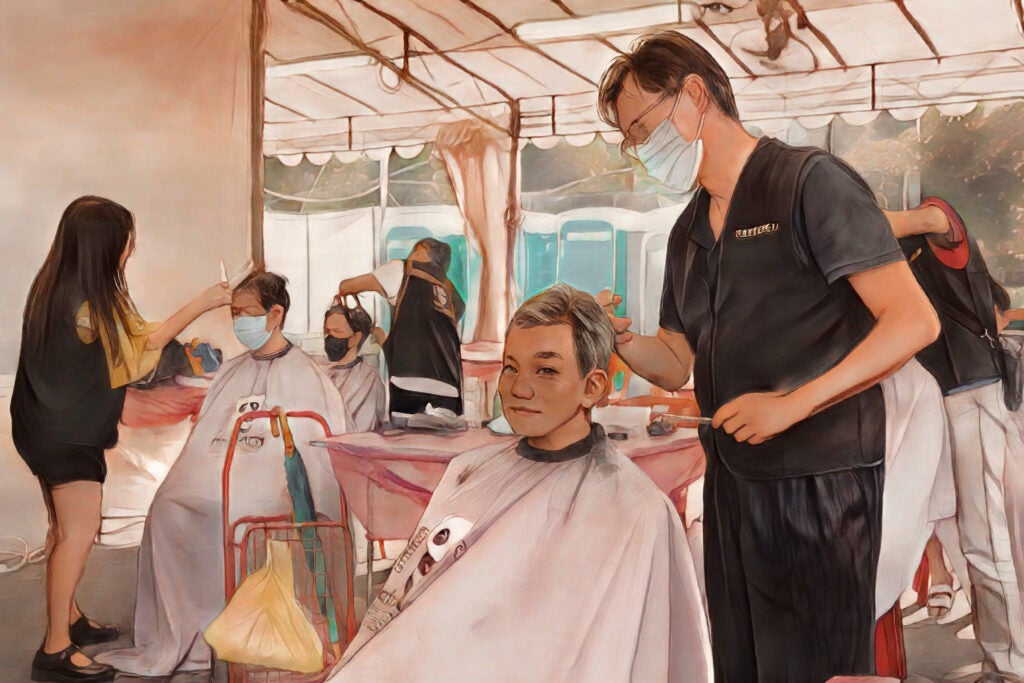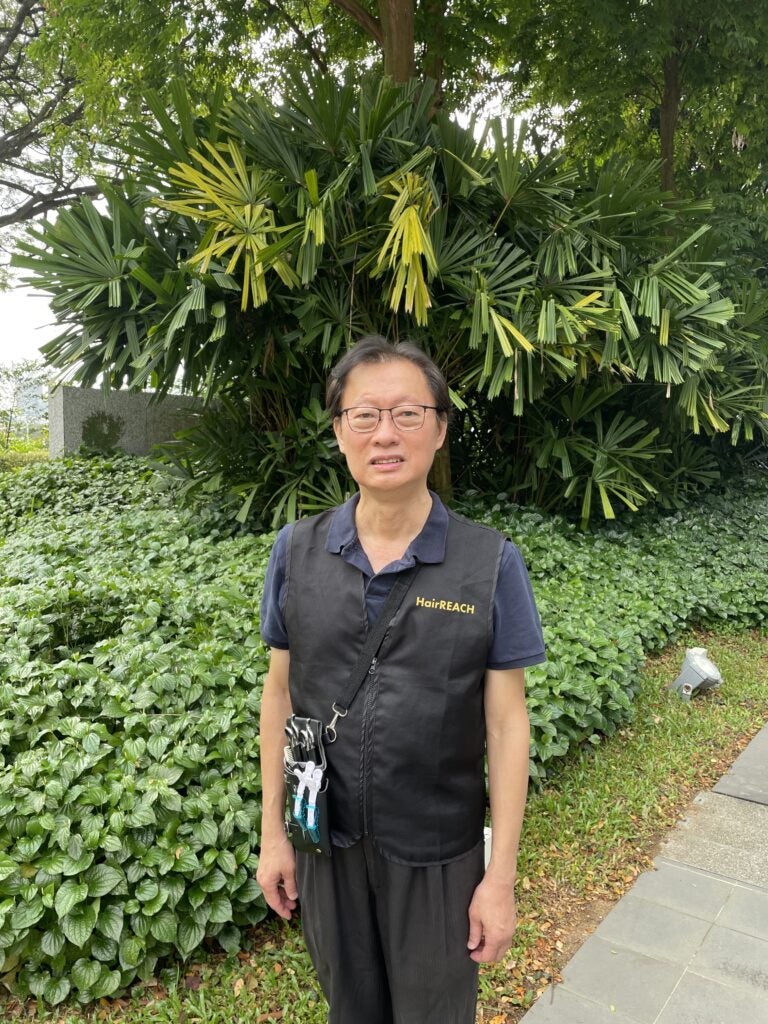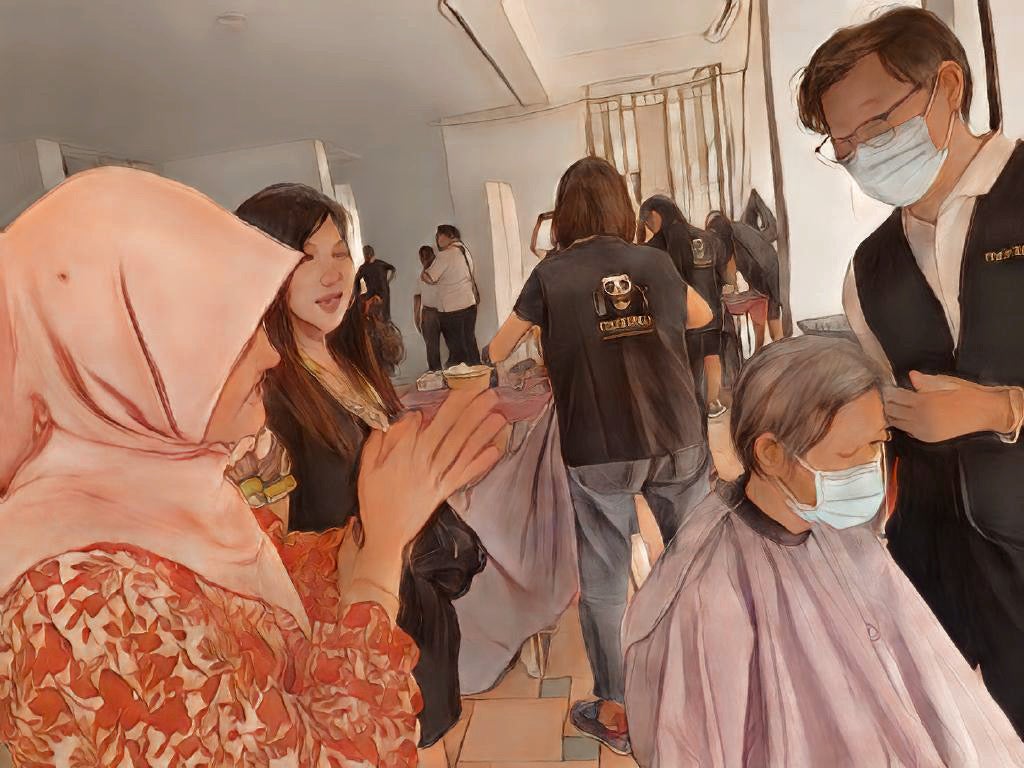A Cut Above
October 07, 2024Since 2022, Assoc Prof Tay Seng Chuan (Science ’85, Computing MSc ’94, Computing PhD ’99) from the Faculty of Science has served as a volunteer hairdresser, providing humanitarian haircuts to marginalised and underprivileged individuals in settings such as hospitals, hospices, nursing homes, migrant worker dormitories, and HDB estates. His new book, Stories Untold: Diary of a Volunteer Hairdresser, chronicles his experiences.

How did you come to be a volunteer hairdresser?
I actually didn’t set out to be a volunteer. But during the COVID-19 pandemic, life was so boring that I decided I wanted to learn a new skill when we came out from lockdown. I took an elementary haircutting class at Kimage Hairdressing School and began to offer haircut services to the students in Prince George’s Park Residences, where I live as a warden for a residential programme. From there, I continued learning and after completing an intermediate course, the School approached me to join their HairREACH Volunteer Group.
People tend to throw around sayings about “giving back to society”. But to be honest, I don’t feel any particular calling; I simply do it. At the end of each assignment, I know that I have made a difference and brought dignity to the beneficiaries.
Your volunteer work has exposed you to a diverse range of people, many of whom exist on the periphery of society. What have you learned about the human experience as a result?
I’ve seen deep love and I’ve seen acute loneliness. I’ve seen how resilient and strong people can be, as well as how fragile they are. It has been a stark reminder that in the last stages of life, everyone will need help, and we cannot walk that journey alone.
On a personal level, I have also learned to be less judgmental. When you attend to beneficiaries in the nursing home, it can look like a physical prison; there are locks on the doors. I used to condemn the people who left their parents there. Who would do such a thing? But I’ve come to realise that sometimes families simply don’t have any other option, and that has deepened my empathy for the circumstances and choices that people are faced with.

A haircut can be seen as a simple act, but on a fundamental level, it can also be a profound way to express care. How have you seen a haircut make a difference in someone’s life?
Although a haircut may take only 10 to 15 minutes, a lot can happen in that amount of time. A beneficiary may start by being moody and end the session smiling. A haircut can give someone new confidence. It can provide them with a person to talk to. There’s also something about physical touch that can convey comfort and connection.
I will say that many beneficiaries, particularly the sick and elderly, may have been abandoned by their families and not had visitors for years. For someone to take the time to provide them with a haircut is often enough to move them to tears.
What was your most memorable haircut?
It was at a hospital for a patient in his 30s – very young and very physically fit. But before I even entered the room, I could hear him screaming, as if someone was trying to kill him or he was on fire. The nurses had to restrain him for me to conduct the haircut. I cried in my car afterward as it was such a sad experience. How did he come to be there? Where were his relatives? What happened to him?
What was the importance of reflecting on each of your assignments to you, and what motivated you to turn these into a book?
This type of volunteer work can be time-consuming and exhausting, both physically and emotionally. You can even get scolded by beneficiaries simply because they are unhappy with their lives and need an outlet to vent.
But I tell my fellow volunteer teammates that we need to detach, and writing has been the way for me to process my experience. This book is called Stories Untold because I hope to bring attention to the parts of society we don’t always see. A lot of people avoid what is uncomfortable, or they may not have the courage to read about the sick or the poor who exist alongside us, but it’s important to share their stories.

How has volunteering complemented your work as a professor?
It has taught me to be more patient and attentive to my students’ needs. For instance, if they require special accommodations during tests or examinations, such as a quiet environment and extended time. I believe that my students have witnessed my simplicity and sincerity, as reflected in my teaching excellence awards at both the faculty and university levels.
How do you hope your experience will impact others?
If I have any objective, it’s that my book can help people be more compassionate, especially towards the underprivileged and elderly. There’s no way to eradicate the marginalised groups in society, and there will always be people who need help. If we can help, we must help.
You’re also an NUS alumnus. Did your education impact your desire to care for others?
Definitely, I was made in NUS! I completed my bachelor’s degree, master’s degree, and doctorate all at NUS and have worked here for 35 years.
There are four people along the way who have particularly impacted me and who I strive to emulate. My thesis supervisor, Assoc Prof Teo Yong Meng from the School of Computing, demonstrated the importance of caring for the welfare and development of students. Emeritus Professor Lim Hock, the Founding Director of Centre for Remote Imaging, Sensing and Processing, taught me how to serve people whole-heartedly – he would often jump up in the middle of meetings to make his visitors fresh coffee. Professor Tang Seung Mun, the former Head of the Physics Department, put tremendous efforts into the welfare and advancement of junior staff, and Emeritus Professor Wong Sek Man taught me to show care and impartiality to subordinates – he also let me practice my haircutting skills on him during my intermediate course!
Stories Untold can be purchased at the NUS Co-Op or by contacting pvotaysc@nus.edu.sg. $1 from every purchase made via these methods will be donated to Community Chest. Alternatively, the book can also be found on Amazon.
Interview by Katherine Chinn. Illustrations and photo provided by Tay Seng Chuan.
Source: NUS Office of Alumni Relation


